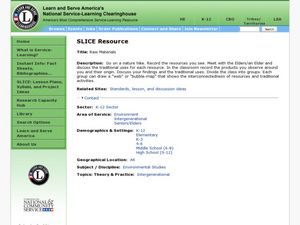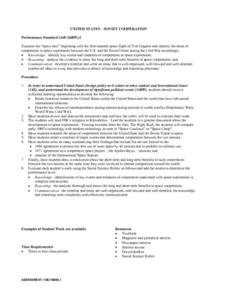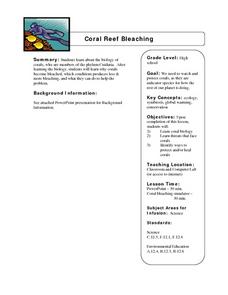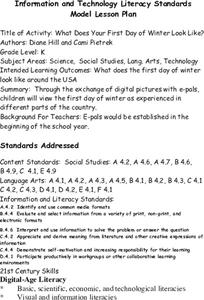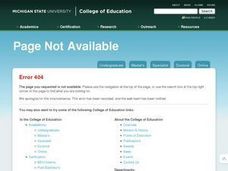Curated OER
Energy Efficiency Ambassadors
High schoolers research and compare two products that provide the same function but require different amounts of energy to do the job. They examine and demonstrate energy efficiency and discover how it applies to different technologies...
Curated OER
Lesson Plan on Landmines
High schoolers take a look at how landmines are being used all over the world (with specific focus on Cambodia). Students identify the physical and emotional impact of the use of landmines and how the international community is working...
National First Ladies' Library
Get Ready, Get Set, We're Moving!
Young scholars use the internet and other sources to research the culture and history of the Philippines. In groups, they discover why William Taft moved to the Philippines. Students participate in a scenario where they make preparations...
Curated OER
Rain Forests: Sustainable Use
Students discuss their opinion on a teacher given scenario. In this chemistry lesson plan, students research the value of rainforests. They relate these ideas to current forestry practices.
Curated OER
Rocket Physics
Students investigate the relationship between impulse, momentum, kinetic and potential energy and aerodynamic drag. In this physics instructional activity, students calculate data taken from launching a rocket. They compare the...
Curated OER
Breaking News English: Kyoto Protocol Heated Bra Developed
In this English worksheet, students read "Kyoto Protocol Heated Bra Developed," and then respond to 47 fill in the blank, 7 short answer, 20 matching, and 8 true or false questions about the selection.
Curated OER
Engineering in a Calculus Classroom
Students solve several differential equations. In this calculus lesson, students test their modulus calculation by testing different weights or beam lengths. They share their findings in class.
Curated OER
Passport to the Eastern Hemisphere
Seventh graders create a time line of significant dates in the history of their nation. This requires students to examine the entire history of a country and make informed judgments based on their historical knowledge.
Curated OER
Learning from history: can it save lives?
Students research and document lessons learned from this disaster, then compile and synthesize information. They write effectively for public education purposes and use visual communications tools
Curated OER
Raw Materials
Students participate in a nature hike and record the natural resources observed. They compare traditional and modern versions of everyday use items, and create graphic organizers that demonstrate the interconnectedness of resources.
Curated OER
Carbon Adventures Game
Sixth graders examine the processes and transformations that occur in carbon pools. They play a game to identify paths taken by carbon through the environment.
Curated OER
United States -- Soviet Cooperation
Students examine the competition between the United States and Russia to put the first man in space. In groups, they use the internet to identify areas in which the two countries cooperated with one another to promote space exploration....
Curated OER
Coral Reef Bleaching
Students explore the structural biology of corals. Working individually, students identify how corals become bleached and which conditions produce more and less coral bleaching. Students explore how this effects the environment and...
Curated OER
What Does Your First Day of Winter Look Like?
Students brainstorm the characteristics of winter. Using an email program, they share their characteristics of winter with those in another part of the country. They compare and contrast each letter they receive with their own criteria...
Curated OER
Famous Marylanders
Fourth graders complete research on a famous person with ties to Maryland. They create web pages then publish and post these web pages on the school web site or another web site.
Curated OER
International Email Connections
Middle schoolers are matched with international students and communicate through email. They concentrate on sentence structure, spelling, details, and composition in their communication.
Curated OER
Subject Selection in Clinical Trials
Students design and conduct an experiment to test a hypothesis. They create a question/objective based on the results of their experiment that can be answered by performing a human clinical trial. Students write inclusion and exclusion...
Curated OER
Detection Detective
Students describe what each detection method uses and rank the wavelengths of each if appropriate. They answer questions about absorption, importance of materials and explain differences. Students make sure they describe diagnostic uses...
Curated OER
The Right Tool for the Job: Diagnosis Spectrum
High schoolers watch a section of a medical TV show and individually make a written recommendation of appropriate imaging techniques to be used and explain why they chose these techniques. They participate in a discussion revealing their...
Curated OER
Thinking inside the Box: Dangers of Tanning Beds
Students research their assigned position pro- or con- for the statement "The use of tanning beds by teens should be regulated" and write a short position paper. They participate in a debate concerning the statement. Students write a one...
Curated OER
World War I: Overview of the Great War
Ninth graders read first hand accounts of soldiers' lives during World War I, examine historical timeline of major events during war, and research and listen to clips of popular music of the time.
Curated OER
Collecting S.O.C.K.S
Students participate in the Collection S.O.C.K.S program to protect their local watersheds. Using the socks, they plant new plants and trees around the watershed in order to protect it for future use. They also perform in a skit that...
Curated OER
Rivers And Capitals
Learners become familiar with the use of GIS for research and become aware of the importance of rivers to cities. They also analyze the placement of cities and learn the names of rivers in the United States.
Curated OER
Indiana Tornado Project
High schoolers become familiar with the use of GIS for research, natural phenomena in Indiana, and analyzing collected information.











